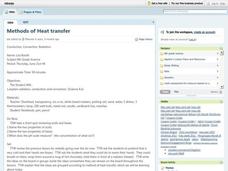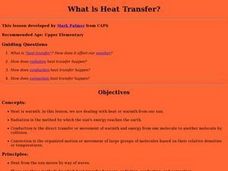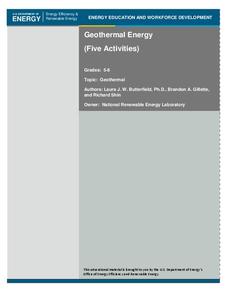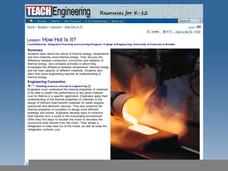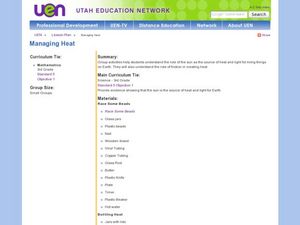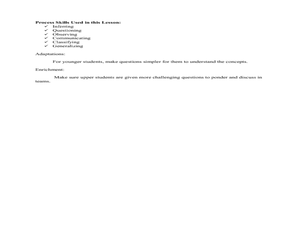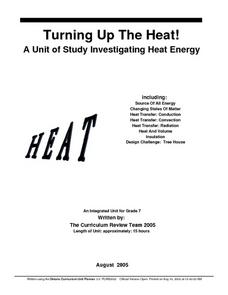Curated OER
Quiz - Method of Heat Transfer
Young scholars take a quiz of method of heat transfer. In this heat transfer lesson, students answer questions in which they tell if the situation describes conduction, convection or radiation.
Curated OER
Three Methods of Heat Transfer
Students participate in a variety of experiments designed to illustrate types of heat transfer including conduction, convection and radiation. They complete worksheets as an assessment of the experiments.
Curated OER
Methods of Heat Transfer
Eighth graders discuss the forms of heat transfer that relate to the human body. Discussion revolves around the ability of different designs of hats to change the rate of heat transfer to and from the body. Students then experiment...
NEED Project
Calibrating Thermometers
Engage young scientists in the upper-elementary and middle school grades with this collection of simple experiments. Whether you're teaching about heat transfer, density, or potential energy this resource has a lab for you.
Curated OER
How Hot Is It?
Discuss the difference between conduction, convection and radiation of thermal energy, and complete activities with your class by investigating the difference between temperature, thermal energy and the heat capacity of different materials.
Curated OER
Methods of Heat Transfer
Eighth graders are introduced to the various types of heat transfer methods. After taking a quiz, they pretend their hands are cold and offer suggestions on how to warm them up. They explain each type of heat transfer method and give...
Curated OER
Heat Transfer
Students examine heat transfer using energy efficient houses. In this heat transfer lesson students calculate the heat that is transferred between a system and its surroundings.
Curated OER
temperature and the Scientific Method Lesson Plan
Sixth graders study heat, temperature, and heat transfer. Using probeware, the teacher demonstrates boiling points. Students participate in experiments and record the beginning and ending temperatures and mass of objects. After...
Curated OER
Conduction, Convection and Radiation
Sixth graders listen to descriptions of types of heat to gain background knowledge For this heat lesson, 6th graders perform experiments to understand various types of heat transfer (convection, conduction and radiation.) Students assess...
Teach Engineering
Insulation Materials Investigation
Don't melt away! Pairs investigate different insulation materials to determine which one is better than the others. Using a low-temp heat plate, the teams insulate an ice cube from the heat source with a variety of substances. They...
US Department of Energy
Geothermal Energy
With Earth Day quickly approaching, as well as many science fairs, why not challenge your class to investigate geothermal energy or other renewable energy resources? There are five driving questions explored in depth here, as well as...
Curated OER
How is heat transferred through conduction?
Fifth graders observe different types of conductors. They answer orally about the conduction of heat energy with 100% accuracy. Students investigate some materials that conduct heat much better than others, and poor conductors can...
Teach Engineering
How Hot is Hot?
Elementary schoolers identify the three methods of heat transfer: conduction, convection, and radiation. The lesson is mostly lecture-based. When the teacher has finished the presentation, groups of pupils get into teams and they must...
Curated OER
Warming by Freezing
Ninth graders discover the reasoning behind spraying water on fruit and seedlings in preparation for hard freezes. In this conceptual physics instructional activity, 9th graders conduct an experiment to measure the heat released when...
Curated OER
Travel Mug Design
Students create and develop a travel mug. They create visuals and a three dimensional infomercial. They apply an engineering design and demonstrate knowledge of thermodynamics involved in heat transfer. They illustrate Newton's Law of...
Curated OER
Managing Heat
Third graders perform various experiments to show the flow of energy that causes heat. For this heat lesson, 3rd graders understand how heat is transferred or trapped. Students use the scientific method and critical thinking skills to...
Curated OER
Heat Energy
Young scholars study how matter changes from solids to liquids or liquids to solids. In this physical science lesson, students discuss heat energy and experiment with heat by changing a candle into a liquid using a hot plate.
Virginia Department of Education
Heat and Thermal Energy Transfer
How does radiation affect our daily lives? Answer that question and others with a lesson that discusses radiation and its use in thermal energy transfer through electromagnetic waves. Pupils investigate vaporization and...
Messenger Education
Cooling with Sunshades
Messenger's sun shade measures 8 ft x 6 ft and will have temperatures reaching 700 degree Fahrenheit on the outside while maintaining a cool 70 degrees underneath. In the third activity of four, groups discuss the basic properties of...
Curated OER
Turning Up The Heat!
Students investigate the properties of heat. They explore methods of temperature control and measurement. Through experimentation and activities, students design a high tech tree house. They consider electrical, solar, and natural heat...
Curated OER
Heat Transfer and Pollution
Students perform computer simulations on air dispersion. In this chemistry instructional activity, students calculate energy transfer based on specific heat and temperature change. They explain the causes of smog.
Alabama Learning Exchange
What Burns When a Candle Burns? an Introduction to Using the Scientific Method
Middle schoolers use the scientific method to discover the role of a candle's wick and how radiation allows candle wax to change from solid to liquid to gas. They work in small groups to use the steps of the scientific method approach in...
Curated OER
Specific Heat Capacity of a Metal
Eleventh graders investigate the relationship between heat and energy transfer. They review terms including heat, work, calorimetry and the procedures for an experiment. After assembling the materials for the experiment, they observe...







